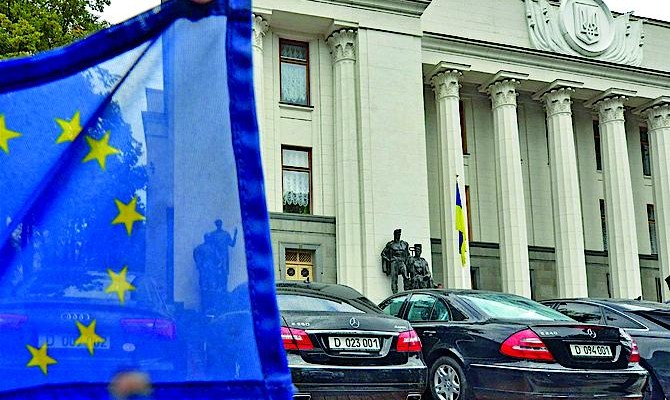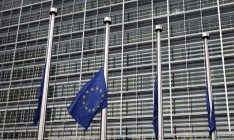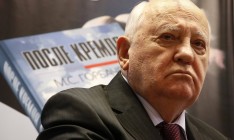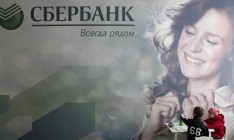Politics
european integrationInstead of sanctions against Russia, the EU demands negotiations from Ukraine

This week the leaders of the European Union will again discuss the issue of introduction of additional sanctions against Russia at the summit in Brussels due to the lack of progress in settlement of the situation in the east of Ukraine. Judging by the recent decision of the EU, however, instead of sanctions against Moscow official Kyiv should be ready to hear criticism for its unwillingness to negotiate with the leaders of the Donetsk People’s Republic and Luhansk People’s Republic.
Who will answer for Russia
On Saturday, the EU published a list of 11 individuals against whom the Council of Europe introduced sanctions. The EU decided against expanding the trade and economic sanctions against Russia for continuing to escalate the situation in Ukraine limiting itself to prohibiting entry of leaders of the self-proclaimed DPR and LPR to the Eurozone. Among them are Prime Minister of the DPR Oleksandr Borodai, Head of the DPR Security Service Oleksandr Khodakovskiy, Prime Minister of the LPR Marat Bashyrov and Speaker of the Supreme Council of the LPR Oleksiy Karyakin. The EU also promised to freeze their accounts and assets, if they are discovered in the European Union.
Noteworthy, this past Saturday Canada announced introduction of sanctions against 14 individuals, which the authorities of the country believe are involved in heating up the conflict in the east of Ukraine. The list also includes leaders of the DPR and LPR.
Former Ambassador of Ukraine to the EU Roman Shpek believes one should not expect that the sanctions will greatly affect the leaders of separatists known for their anti-Western position. “None of them are planning to travel to developed democratic countries. They are preoccupied with other thoughts. So, this is more of an imitation of sanctions than actual sanctions,” he told Capital.
Former Presidential Chief-of-Staff and member of the VR European Integration Committee Viktor Baloha is of a similar opinion. He called the sanctions introduced by the West against the leaders of self-proclaimed republics and field commanders “a scorn against Ukraine”.
Capital’s source in the Foreign Affairs Ministry said the EU promised to again consider a transition to the third level of sanctions against Russia as early as this week at the EU Summit in Brussels scheduled for July 15-16. “The issue of sectoral sanctions is being raised among European politicians, although, judging from recent decisions, nothing serious should be expected from the EU,” he said. Former Foreign Minister Anatoliy Zlenko also does not believe in decisive actions of the EU. “The EU conglomerate has never been decisive, preferring to act with caution, let alone in situations that concern it and incite different assessments inside the EU. Sanctions are easily announced, but their implementation, and hence their effectiveness, are not clear,” Zlenko told Capital.
EU recognized the DPR
Ukraine’s Ambassador to the EU Kostyantyn Yeliseyev in a commentary for the UNIAN agency criticized the decision of the EU Council. Yeliseyev said he had an impression that some countries of the EU are “playing a double game”.
Professor at the Polish Institute of International Affairs in Warsaw Andrzej Szeptycki told Capital that the decisions of the European Union are dictated by the positions of France and Germany, which continue to convince the EU of the effectiveness of their intermediary peacekeeping initiatives. “France and Germany have strong economic ties with Russia and therefore they are not interested in sanctions and will be demanding a political decision from Ukraine, i.e. reaching a compromise with separatists. Moreover, I predict that if Russia continues its actions, a blind eye will be turned to it and Ukraine will be accused of military actions that violate certain agreements,” said the Polish expert.
In confirmation of his words, on Friday Spokesperson of the German government Steffen Seibert announced the need to hold emergency negotiations of the trilateral group, including Ukraine, Russia and the OSCE with the representatives of DPR and LPR. Earlier, the sides already held two rounds of talks, which produced no results. Assistant Presidential Chief-of-Staff Valeriy Chaliy said Kyiv is not ready for negotiations with leaders of the separatists, but hopes to continue the work of the contact group.






 of the agreement of syndication with Financial Times Limited are strictly prohibited. Use of materials which refers to France-Presse, Reuters, Interfax-Ukraine, Ukrainian News, UNIAN agencies is strictly prohibited. Materials marked
of the agreement of syndication with Financial Times Limited are strictly prohibited. Use of materials which refers to France-Presse, Reuters, Interfax-Ukraine, Ukrainian News, UNIAN agencies is strictly prohibited. Materials marked  are published as advertisements.
are published as advertisements.